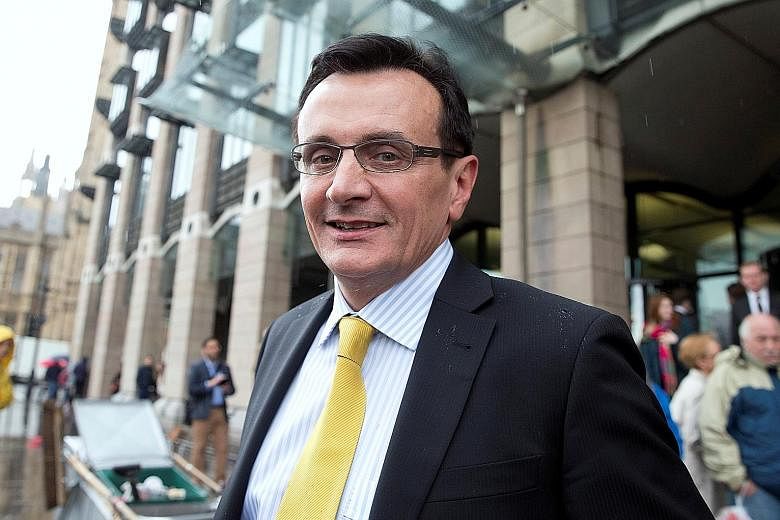PARIS • AstraZeneca's chief executive has insisted that the company was not selling coronavirus vaccines ordered by the European Union to other countries at a profit, after delayed orders sparked fury from EU leaders.
The British-Swedish pharmaceutical firm said last week it would not meet its contractual delivery commitments to the EU in the first quarter, which an EU official told Reuters last week amounted to a 60 per cent reduction to 31 million doses caused by production issues at a factory in Belgium. The EU contract with AstraZeneca is an advance purchase agreement for the supply of at least 300 million doses, provided that the vaccine is approved as safe and effective.
AstraZeneca's announcement prompted European Health Commissioner Stella Kyriakides to say that the EU plans to start tracking vaccine shipments exported to non-member countries.
AstraZeneca CEO Pascal Soriot sought to calm the situation on Tuesday, acknowledging that European governments were growing "aggravated or emotional" due to repeated stumbling blocks in their vaccine roll-outs.
"Our team is working 24/7 to fix the issues of production of the vaccine itself," he told the Leading European Newspaper Alliance. "We're certainly not taking vaccine away from the Europeans to sell it somewhere else at a profit."
The firm, which paired with Oxford University to develop the vaccine, has pledged not to profit from vaccine sales during the pandemic.
The Oxford-AstraZeneca vaccine is still awaiting regulatory approval in the EU, with a decision from the European Medicines Agency (EMA) due tomorrow.
"As soon as we get an approval by EMA, in the next few days, we will be shipping at least three million doses immediately to Europe," Mr Soriot said. "The target is to deliver 17 million doses by February."
Europe is on track to receive 17 per cent of AstraZeneca's global production next month "for a population that is 5 per cent of the world population", he noted.
AstraZeneca's woes came a week after United States company Pfizer said it was also cutting early delivery volumes of its vaccine produced with German firm BioNTech.
The announcements risked up-ending the EU's vaccination programmes while heaping pressure on the European Commission, which negotiated orders on behalf of all 27 member states.
Mr Soriot noted that recently departed EU member Britain had started its roll-out three months earlier. "So with the UK, we have had an extra three months to fix all the glitches we experienced."
In the interview with newspapers on Tuesday, Mr Soriot said the EU contract was based on a best-effort clause and did not commit the firm to a specific timetable for deliveries, as the EU insisted on receiving the vaccine about the same time as Britain despite putting in its order three months later.
An EU official said yesterday that details revealed by Mr Soriot on production capacity and best-effort clause were confidential, adding that the best-effort clause was standard in contracts with manufacturers of products that are in development.
"Best effort is a completely standard clause when you are signing a contract with a company for a product that does not yet exist," the official said. "Obviously you cannot put a completely legal obligation" under these conditions.
AstraZeneca's vaccine is cheaper than those from Moderna and Pfizer-BioNTech. It is also easier to stock as it does not need to be kept at ultra-low temperatures.
The EU was asking AstraZeneca to publish the contract it signed with the bloc on Covid-19 vaccine supplies, an EU official said. But the firm pulled out of a meeting with the EU scheduled for yesterday, the official said.
Governments across the bloc are eager to dodge the blame for the lacklustre efforts in containing the pandemic, which could force them to prolong lockdowns. The measures have crippled industries from aviation to hospitality, and are causing growing discontent.
AGENCE FRANCE-PRESSE, REUTERS, BLOOMBERG
SEE OPINION

